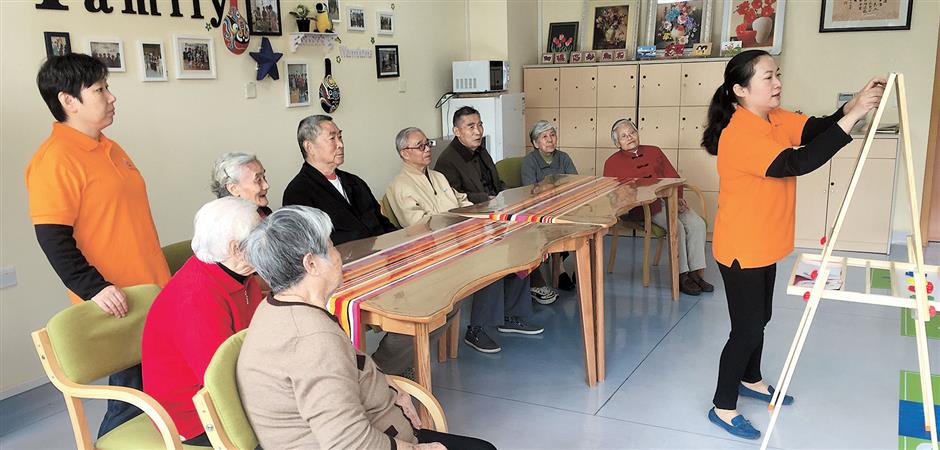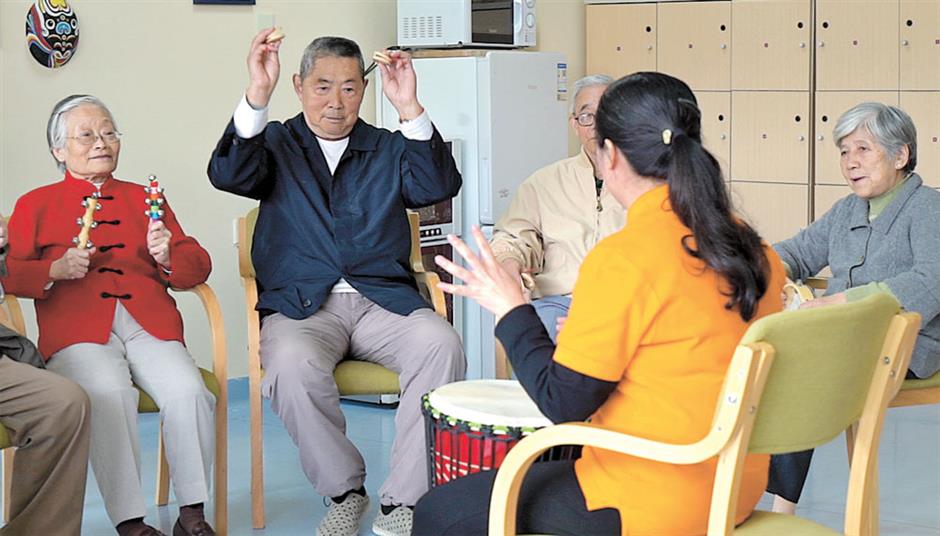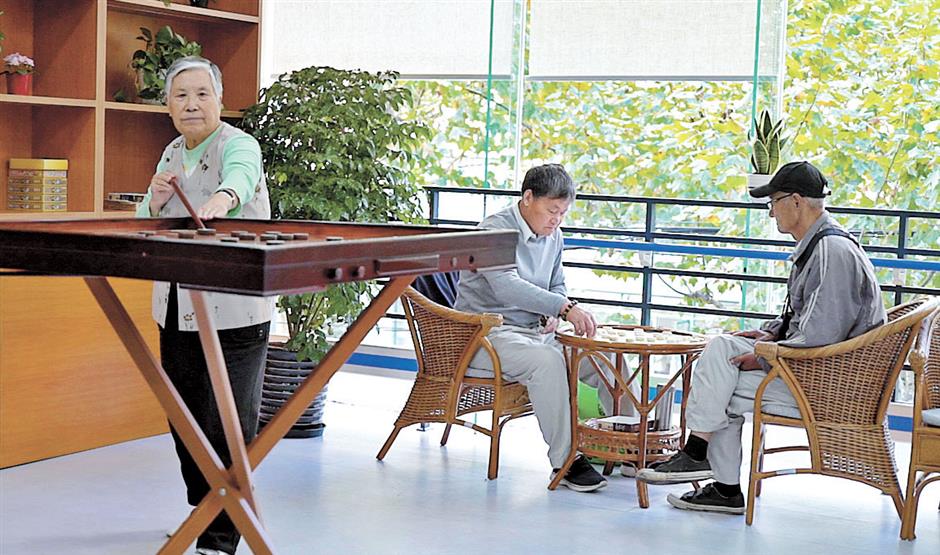
Chen Yan (right), head of the elderly day care center in Hongkou’s Jiaxing Road subdistrict, plays a game with residents who live nearby to help improve their reaction times. President Xi Jinping was at the center last week during his two-day inspection tour of Shanghai. The center provides daytime activities, meals and medical help for elderly people.
Daycare in China isn’t only for the young. It serves both ends of the age spectrum.
For the elderly with working children or without in-home care, senior daycare centers are a godsend that keeps them out of nursing homes.
No less a dignitary than Chinese President Xi Jinping praised the concept last week during a visit to a model elderly daycare center in the Hongkou District.
"It is our common wish that elderly people lead a happy, healthy and long life,” he said, stressing the need to implement aged care policies to benefit more people.
The center he visited is a demonstration site for how elderly facilities should operate. It treats seniors with dignity and warmth, providing a full array of activities, entertainment and recovery therapies.
Feng Luxian, an 81-year-old retired architectural designer at the center, gives handicraft classes to help seniors retain their agility. He shows them how he builds delicate miniature wooden houses, one of his retirement passions.
His wife Yu Changzhu, 79, a former clinic doctor at a local textile company, also finds fulfillment at the center by teaching other seniors how to weave mobile phone covers and coasters.
The couple began going to the center every day in June, after both had undergone surgical procedures.
 Tang Dafei / SHINE
Tang Dafei / SHINEChen Yan gives one of her popular musical therapy sessions. These small “concerts” can help to improve reaction times and agility, while raising self-esteem.
"We stay at the center between 8:30am and 4pm every day, where we can play games, enjoy traditional operas, chat with neighbors, enjoy lunch and see a doctor," Yu said.
Due to the baby boom in the 1950s, Shanghai’s elderly population last year grew 5.6 percent from 2016. Those 60 years and older numbered 4.8 million at the end of 2017, comprising about a third of the city’s residents.
The Hongkou, Huangpu and Putuo districts have the highest percentages of seniors.
Jiaxing is one of eight subdistricts in Hongkou and alone has nearly 40 percent of residents 60 years or older, said Li Qi, deputy director of the subdistrict.
Some 90 percent of Shanghai's seniors are cared for at home. The long and honored tradition of filial piety means that children are reluctant to put frail parents in nursing homes. But when children work or can’t be around all the time, parents may need help and oversight during the daytime.
To fulfill that need, the city government has established 352 daycare centers citywide.
In Hongkou, 37 citizen service stations have been built, most of them with daycare centers for seniors. The district aims to eventually have such centers within a 15-minute walk from each resident.
As a demonstration site, the center in the Jiaxing subdistrict is adjacent to a community family clinic, staffed by three general practitioners and a traditional Chinese medicine doctor.
 Tang Dafei / SHINE
Tang Dafei / SHINESeniors are able to play board games as well as read and chat in the vestibule of the elderly day care center.
In addition, medical personnel from nearby Yueyang Hospital attached to the Shanghai University of Traditional Chinese Medicine go to the center regularly to give physical checkups and health talks.
A community canteen operates alongside the center, where seniors can enjoy meals at affordable prices in a pleasant environment. With subsidies from the government, a meat dish, such as pork chops, costs about 5 yuan (71 US cents), while vegetables cost 2 yuan -- far cheaper than nearby restaurants.
The canteen receives 1,600 diners daily, including many nearby residents.
"Thanks to the canteen, we don't have to go shopping at the wet market and then cook for ourselves,” Yu said. “Our sons used to worry that we might forget to turn off the gas."
The daycare center, which opened in February 2017, receives about 40 seniors every day. Their ages average 86, said Chen Yan, the head of the center.
"We aim to enhance the happiness and self-fulfillment of the elderly rather than simply taking care of and feeding them," she said.
Chen visited more than 60 elderly care homes and daycare centers nationwide before designing a center that was both innovative and nurturing in its approach.
During music therapy sessions, for instance, each senior can choose a rhythm instrument and follow the beat of the music. These small “concerts” help improve reaction times and agility. They are also a lot of fun, Chen said.
Another session, aromatherapy, allows seniors to smell different plants like lemongrass to help relax them, she added.
There are also classes in weaving, handicrafts, painting, calligraphy, poetry, singing and dancing. More capable seniors can play pool or table tennis in the vestibule of the center. Psychological consultants are on hand to help those coping with loneliness.
The center also allows people like Feng and Yu to share their hobbies or former professions with other seniors, Chen said.
Xia Juanjuan, 82, a former elementary school teacher, shows other seniors how to recite and enjoy traditional Chinese poetry. Another senior, Zhu Deming, 87, shares his hobby of ink painting, which helped decorate the center.
Citywide, an additional 80 daycare centers are being built this year with government subsidies and preferential treatment on taxation and operating costs.
